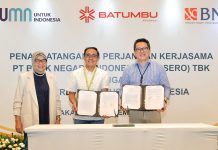The growth rates of the sharia economy in 2020 and early 2021 have been better than those of the national economy, Bank Indonesia (BI) has said.
“In 2020, the growth of the sharia leading sector contracted by minus 1.72 percent, while the national growth, minus 2.07 percent,” deputy governor of Bank Indonesia, Doni Primanto Joewono, noted while joining FESyar 2021 KTI online from Jakarta on Tuesday (July 27, 2021).
Sharia economic and financial performance in the first quarter of 2021 has also shown improvement, he said.
BI recorded positive growth of 1 percent in the sharia economy and finance sector compared to the previous quarter, he informed.
The climb was supported by the leading sectors of the sharia economy, which were agriculture, halal food, Muslim fashion, and Muslim-friendly tourism, he said.
“Therefore, we consistently carry out the blueprint of Indonesia’s sharia economic development, which has become the master plan (comprehensive planning) of Indonesia’s sharia economy,” Joewono said.
“The three blueprints of sharia economic development are halal industry, sharia finance, and sharia economic and financial literacy,” he said.
According to BI, halal food, as the leading sector of Indonesia’s sharia economy, has the potential to grab a global market share of 13 percent. Indonesia’s halal food industry ranked 4th in the world in the Global Islamic Economic Indicator, Joewono noted.
“This is an opportunity for us. We need to diversify the sharia products’ purpose. It is possible to expand halal food exports, as in the first quarter of 2021, the export has reached US$10.34 billion,” he informed.
Joewono said that Bank Indonesia is also focusing on boosting regional quality resources to further aid national economic recovery.
In this regard, BI aims to produce high-quality Indonesian products, while supporting the improvement of Indonesia’s balance of payments (BOP) by pushing up exports and boosting inclusive growth, he informed.
The 2021 East Indonesia Sharia Economic Festival (FESyar 2021 KTI) is part of Bank Indonesia’s efforts to explore and develop each region’s potential to produce sharia products, Joewono said.
“The pandemic has tended to hinder global supply chain activity, but it has become an opportunity for Indonesia to revive local markets and national production activities,” he added. – (Antaranews)














